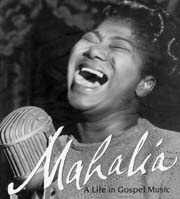A powerful, soulful voice and a surplus of perseverance propelled Gospel singer Mahalia Jackson to the apex of her art from the 1950s until her death in 1972. A new book, “Mahalia: A Life in Gospel Music” (Candlewick Press, January 2002) by Hoboken resident Roxane Orgill celebrates the life of one of the Gospel music’s most influential performers of the 20th century.
Orgill’s rhythmical narrative abounds with social history and conscience when it describes every aspect of Jackson’s life and music, from her impoverished birth to her rise to fame in Chicago to her appearances before thousands of civil rights marchers in the 1960s.
The book is geared toward readers ages 10-14, but its meaningful social commentary and dynamic voice give the book a much more adult feel. In the book’s introduction, Orgill expresses her desire to make the book’s language lyrical. “Mahalia’s singing freed me to write a different sort of biography,” says Orgill in the introduction. “I wanted the story to have music in it; that is, to make the writing musical.”
Gospel music is the blending of traditional slave spirituals with the driving rhythmic emphasis of blues and early jazz. As the Gospel style of music evolved, soloists exhibited more virtuosity, especially in the South where the music is performed with wild emotion in order to express the ecstasy of spiritual revelation.
In her book, Orgill taps into the passionate raucous energy and makes even the most mundane situation seem harmonious and euphonious. An example of this type of language is in the second chapter, when the author describes Jackson’s household chores.
“As she grew, so did the list of chores,” she writes. “Clean the flat iron with a chunk of red brick. Pass the irons over a cedar branch to make them slip. Heat the irons on the cast-iron stove, then slide them back and forth over the clothes to take the wrinkles out. Halie sang to the slap, glide, glide of the flat iron, ‘I’m goin’ down the river, goin’ down to the river, goin’ to take my rockin’ chair.'”
Bit o’ history
In addition to its lyrical beat, the book serves as an interesting supplement to history books, especially those dealing with the black experience in the 20th century.
When Jackson was 16, she moved with her aunt to Chicago. During that time period, which is often referred to as the Great Migration, over 50,000 African Americans moved to Chicago looking for a better life.
Later, Orgill recounts Jackson’s first return to the South after making it big in the Northeast. The singer had just sold out Carnegie Hall to rave reviews by both black and white audiences. Then in 1951 she returned to the South and was greeted by a very different experience that evoked many of the powerful emotions roused by segregation. “A big, fancy automobile full of Negroes was not a welcome sight in the South,” she writes. “Gas stations wouldn’t sell gas to them. Restaurants near the main highway wouldn’t serve them. Even drive-in restaurants were off-limits.”
Even in the North, Jackson found it difficult living as a successful black woman. The book tells about the time that she bought a home in an entirely white neighborhood. Threats to the signer were so slanderous and vicious that Chicago Mayor Richard Daley, a close friend of Jackson, had to assign a police guard to protect her.
By the 1960s, Gospel Music and the civil rights movement became linked. “By 1963 it was impossible to separate the two; gospel songs and the spirituals propelled the marches, prolonged the sit-ins, and drove the freedom rides,” Orgill writes. “Mahalia lent her voice to the demonstrations whenever she was asked.”
In an interview Wednesday, Orgill said that in addition to her powerful voice and her soaring music, Jackson’s personal determination attracted her to the project.
“I really liked her perseverance,” said Orgill. “She had to make something out of herself with very little to start with.”
Orgill, an award-winning writer, has 20 years experience as a music critic for the Wall Street Journal, the New York Times, the Bergen Record, Billboard Magazine and the Milwaukee Journal. She is also the author of Shout, Sister, Shout! Ten Girl Singers Who Shaped a Century, and If I Only Had A Horn: Young Louis Armstrong, illustrated by Leonard Jenkins.
Orgill has lived in Hoboken since 1989 with here husband and two children. She also sings with the choir of the All Saints Church and has been an active member in The Friends of the Public Library.
Orgill will be reading from her book and answering questions at Barnes and Noble on 465 Edgewater Road in Edgewater on June 1 at noon. To purchase a copy of Mahalia: A Life in Gospel Music, visit www.Amazon.com.
